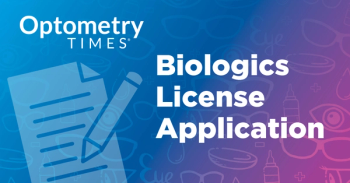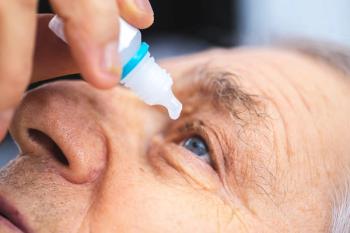
AAOpt 2023: Plenary: Mental health and optometry
Bringing awareness, understanding, and embracing mental health care gives clinicians the space to best support and empower their patients, as well as themselves.
Dennis Pardo, OD, MPH, FAAO, LCSW, has been on the front lines of bringing awareness of mental health care to the optometry community, and is one of three individuals giving the plenary, "Mental health and optometry," during the 2023 American Academy of Optometry meeting in New Orleans. Pardo sat down with Optometry Times® editor Kassi Jackson to discuss the plenary and the importance of the work being done—and still to come—at the intersection of mental health care and optometry.
Editor's note: This transcript has been edited for clarity.
Kassi Jackson:
Hi everyone, I'm sitting down with Dr. Dennis Pardo, who co-presented the keynote address, "Mental health and optometry," at the American Academy of Optometry meeting this year in New Orleans. Thank you for joining us, Dr. Pardo.
Dennis Pardo, OD, MPH, FAAO, LCSW:
Oh, it's a pleasure to be here. Thank you for having me.
Jackson:
We're very happy to have you. So this is such an important topic to discuss. Can you please share with us an overview of the keynote?
Pardo:
Yes. So I will be one of 3 people. And my perspective is: I'm an optometrist, and I basically retired from optometry and went back to school to become a psychotherapist. So, loving my profession of optometry—[I] practiced for over 20 years—I really wanted to keep my hand in the profession. And one of the things that I wanted to do when I even thought about becoming a psychotherapist is to educate optometrists on the basic psychology that we need to understand in order to provide the best care for our patients.
Optometry by and large is a very happy profession; we help people see better, but we also deliver bad news. We have to give a diagnosis sometimes, unfortunately, of a sight-threatening condition. We're also mandated reporters if we suspect abuse. And so there are a lot of psychological issues that we just don't get adequate training on. So I tried to fill that niche. And it's become really, really successful.
I'm very passionate about this topic, and [am] so thrilled that the Academy deems it important enough to make it the plenary.
I'm very passionate about this topic, and [am] so thrilled that the Academy deems it important enough to make it the plenary.
Jackson:
What common mental health conditions might optometrists see in their chair?
Pardo:
Yes. And actually, when I presented this, I actually have a slide that goes over the most common mental health conditions we might see in our chair. So obviously, anxiety and depression are number 1 and number 2, but other things that we'll see is attention deficit hyperactivity disorder or ADHD, we might see OCD, obsessive compulsive disorder. We might see a whole host, it really ranges from A to Z.
But what I did in the plenary is really what are the major conditions that we will likely see. I also dovetail that with—it's really important, it all starts with the intake. So when we see a new patient or we update information, we want to have a section that has any mental health conditions side-by-side with physical health conditions. We want to know any mental health medications side-by-side with any non-mental health medications.
That's really where we start—Educating optometrists on, What are the conditions we might see? What are the medications that may go with them? [It] is really important, because some of them have ocular side effects.
Jackson:
Yeah. And you mentioned being a mandated reporter. So can you explain for those who might not be aware what is a mandated reporter?
Pardo:
Yes, I mean, pretty much any healthcare practitioner, we're mandated reporters for suspected abuse. So that would be to children, that would be to the elderly, and that would also be to disabled persons. That is a very important role. Fortunately, in my career, I only had 1 case, over 20 plus years, where I did have suspected abuse, and I did have to report.
A lot of us don't understand that's part of our role, so I think it's important to sort of re-educate that is a part of our role as a healthcare professional. To understand a little bit about what that responsibility it is, what emotions may come up in you, as the optometrist who may have to report, and so I think it's an important topic. And that's why I include it in all of my lectures, as well as here at the plenary.
Jackson:
Yeah, advocacy is such a huge part of any career. I think, like you said, as healthcare professionals, it's especially important to advocate for your patients. How does mental health care directly impact patient care?
Pardo:
It does, because, for instance, you know, white coat syndrome. Right now, a lot of us as healthcare providers, we're wearing scrubs, we're not wearing the white coat, but, you know, people are anxious. Especially if, let's say, they've never seen a primary care physician.
As primary care physicians for the eye, we may be the first one to detect diabetes, obviously ocular conditions like glaucoma, which can be sight threatening, if not treated effectively. Retinitis pigmentosa, which is sight threatening and progressive. We have to be aware that patients may be coming to us with anxiety.
Even if their goal is to just sort of get a contact lens prescription. They know that we're going to do a health assessment in many cases. If they have a family history of diabetes, or other conditions, ocular or non-ocular, that we might detect.
Understanding that people may be coming in with anxiety, being able to recognize the basic signs of that, and maybe have a couple of tools that they can use to help the patient feel more calm, particularly if it's a new patient, and it's the first time you're seeing them.
Jackson:
Kind of building off of that, how can clinicians best weave mental health care and awareness into their clinics to most empower their patients?
Pardo:
The first step is, like I said, I think it's worth reiterating, is to make sure you have sections on your intake for mental health conditions and for what we call psychotropic medications—medications for mental health conditions.
I educate optometrists about the basic psychopharmacology of mental health medications so that they are aware, very high level, but I think it's really important. Just like we need to be aware of medications for non-mental health conditions. So I think that's the first steps. And what that tells the patient is, this is just as important as your physical health. Because we know that mental health and physical health are inextricably related. We can't separate them. We need to as optometrists treat the whole patient, not just the eye. I think that's the first step.
The other step is to be a source of resources and referral. So for resources, in my lecture, I give the basic resources that optometrists should be made aware of. And I also recommend that as part of your referral network, you should include 1 to 2 mental health professionals in your community. That's not only good for you, in order to have a resource to refer patients, but it's great because it could be a 2-way referral, it's another referral source. Where if you refer a patient to a mental health practitioner, they are likely going to think of you when someone might need an eye exam. "Do you know an optometrist in the area? Well, yes, I do. You know, Dr. Pardo is someone in the community." And so I think it's a double benefit there for the patient and for the optometrist to do that.
Jackson:
Absolutely. And you mentioned resources, what resources are available to optometrists to provide this care?
Pardo:
Yes. Specifically I have a slide in my lecture on certain ocular conditions are associated, corroborated through real research, with anxiety and depression. And those are Sjögren's syndrome, glaucoma, [and] retinitis pigmentosa. So these are conditions that we know, from studies, that we can really have a higher level of anxiety and depression in these patients.
So I provide resources for support groups for each of those conditions. So that's a really, really good start. And those are not the only conditions. Those are the most common conditions where there's a comorbidity of anxiety and depression. But any ocular condition for which we might anticipate anxiety and depression, there is a support group for that those just happened to be the sort of the top 3 that really come up.
Jackson:
Yeah. And I think too, part of it is just normalizing that conversation, right, and normalizing seeking that help and those resources and that it's okay, you know, so I think that's a huge part of the conversation.
Pardo:
Yes, I mean, if there's anything that we could say that was good that came out of COVID, is the fact that mental health became front and center. And stigma has reduced tremendously. More work needs to be done. So if we have this on our intake, it's like, oh, yes, of course, my optometrist wants to know about my mental health, that really also helps to perpetuate that, yes, we need to seek mental health treatment if we have issues. And reducing stigma is very, very important.
Jackson:
Kind of switching gears, to the clinicians own mental health care. When looking from a healthcare perspective, you know, a lot of times you're giving the care you don't always think about yourself, right. So what steps can practitioners take to mitigate burnout and empower themselves in their own mental health care?
Pardo:
Yes. And I was fortunate enough to do a podcast on the Power Hour The CEO is Dr. Bethany Fishbein. She was a classmate of mine at the New England College of Optometry and she reached out because she read some of the articles that I had written one in Optometry Times. It was the cover article for the March 2021 issue. I've been trying to raise awareness. That podcast was focused on that question. First and foremost, to recognize that as an optometrist, you're a human and you might have some mental health issues and to seek treatment for yourself. To also have a practice environment where it's okay to bring up issues. Employees feel comfortable that if they're having a mental health issue, and they might need to have a mental health day, that that's something that is comfortable in the practice.
The other thing is to have sort of a practice support group. Like as part of a weekly meeting, have a section to talk about, are there any issues that might be important. We don't even have to label them as mental health issues, but making it like any issues that you have are welcome here. You know, that provides an environment that is psychologically safe. That helps to improve, as I mentioned, in this podcast, the productivity of the practice.
If we just ignore issues, it begins to fester. If we don't attend to them, then that can erode in the bottom line of a practice and even in the delivery of patient care. So I think it's [a] really important issue that optometrist need to be aware of, and to really have that philosophy in their practices.
Jackson:
Absolutely. And, you know, again, advocacy, right? So, you know, we've touched on a lot is there anything else that we haven't touched on that you want to make sure we talk about?
Pardo:
I think just awareness is the most important thing and that, my genesis of when I started putting together my first 2 hour cope lecture on this topic. Was to really provide awareness that mental health and optometry, it's a very important topic. And I think optometry schools are doing a much better job these days than when I went to school to address this issue.
I really appreciate that Optometry Times® deemed it important enough to chat with me today about this topic because it only helps to increase the awareness and that's the reason why I started this in the first place.
Jackson:
I know I'm glad to see you doing this work, and I'm sure so many others are very thankful for the work that you're doing and others that you work with on this advocacy. Thank you so much for your time today, Dr. Pardo.
Pardo:
Oh, you're very welcome. Thank you so much for having me.
Newsletter
Want more insights like this? Subscribe to Optometry Times and get clinical pearls and practice tips delivered straight to your inbox.








































